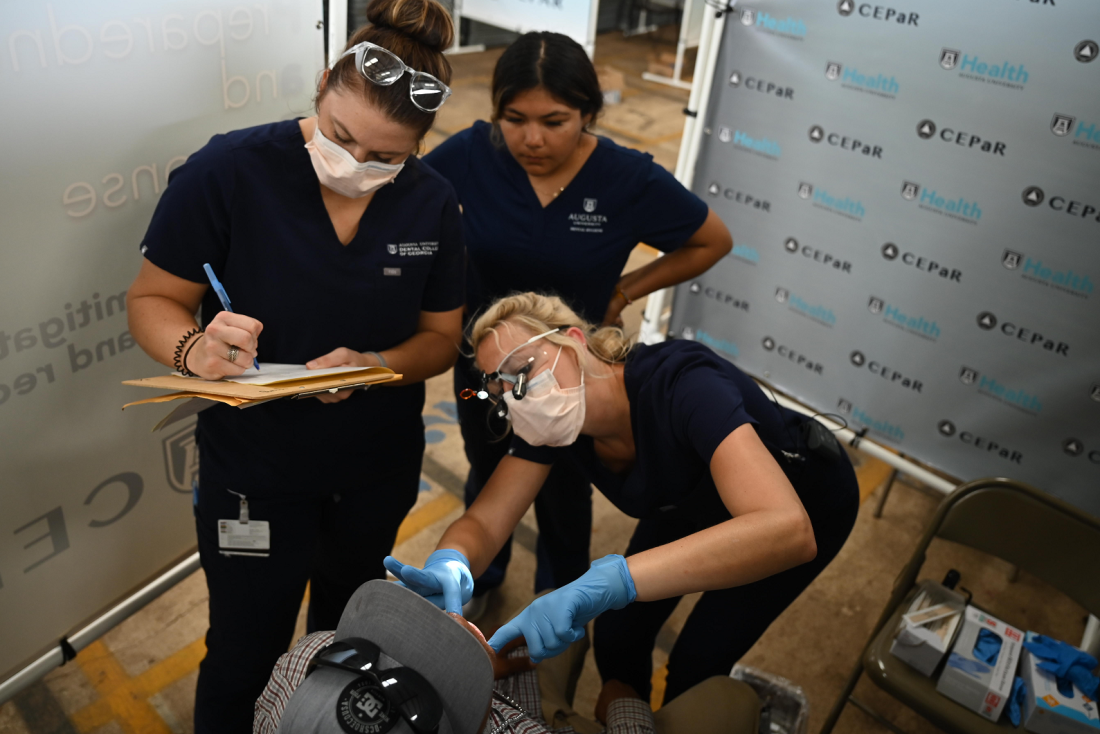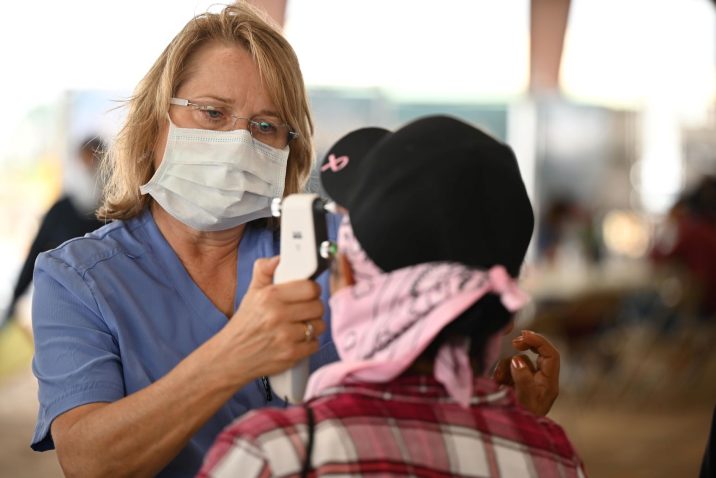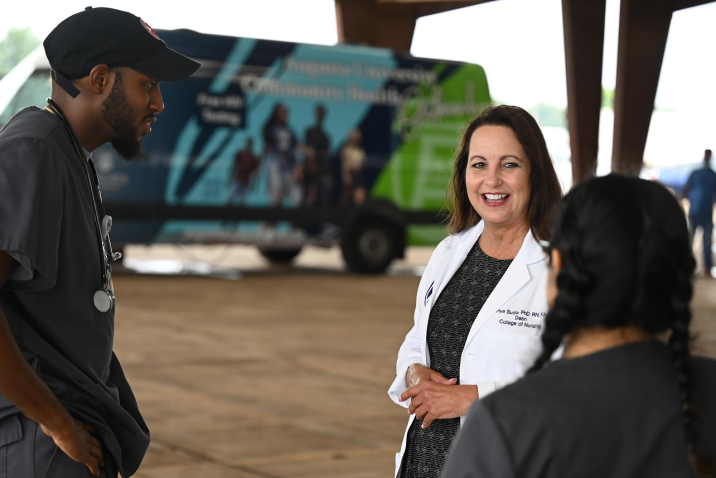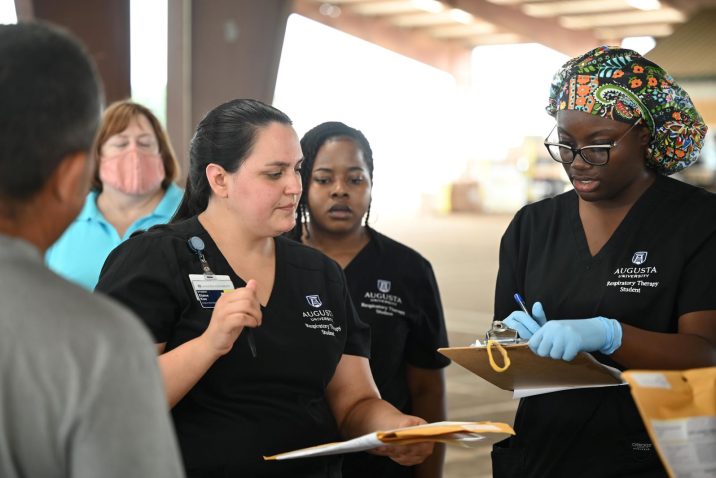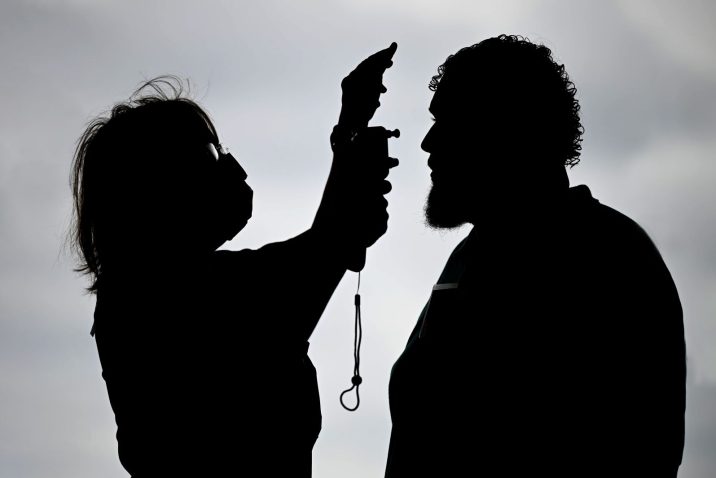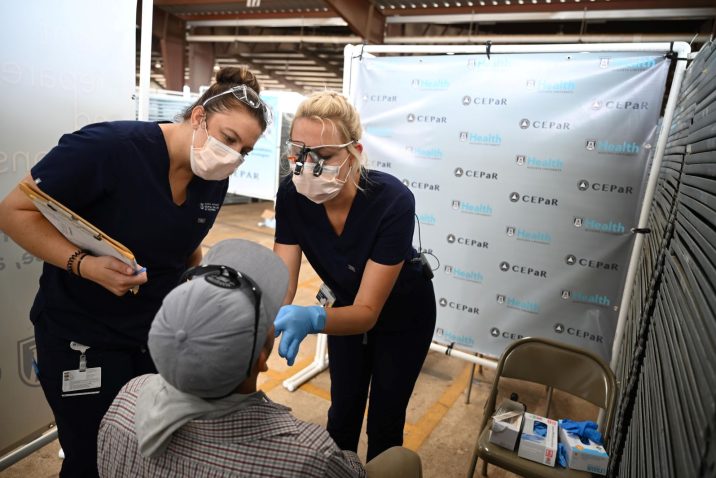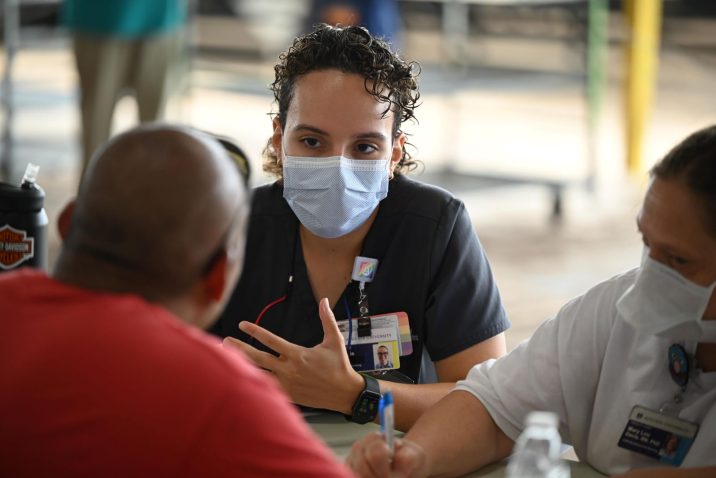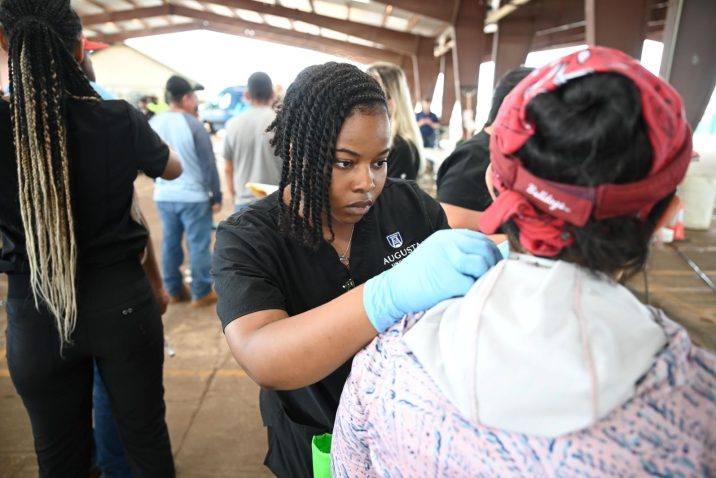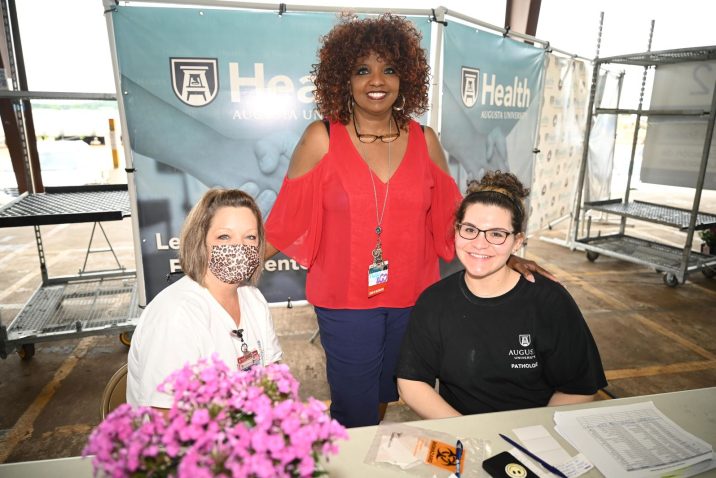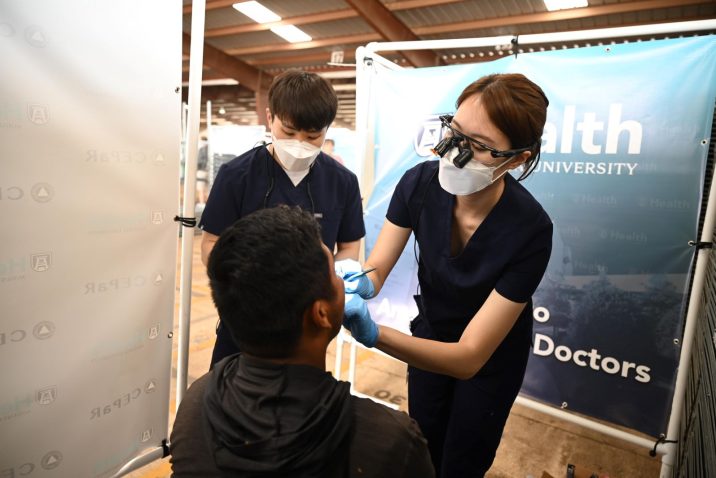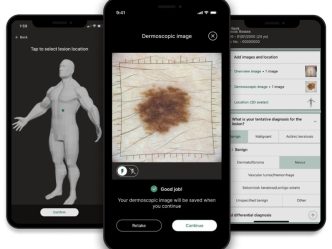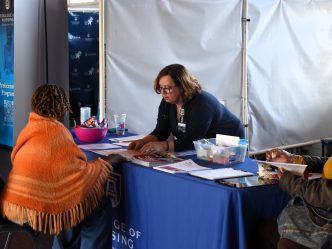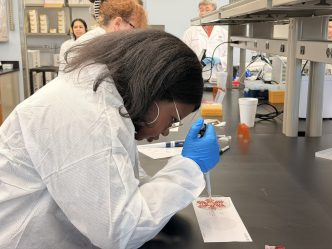For the past seventeen years, Augusta University and the College of Nursing have partnered with health organizations across Georgia and South Carolina to provide health care to farmworkers at Costa Farms in Trenton, South Carolina.
On July 22, the Costa Layman Health Fair returned to its onsite location to provide health care to more than 220 Costa farmworkers.
“It’s a fantastic opportunity for our students to be able to apply their skills that they’re learning in the classroom and simulation to a real-world setting and it’s also a great opportunity for the farmworkers to see the connection to the university the services that nursing can provide,” College of Nursing Dean Tanya Sudia said.
“We also have our College of Allied Health Sciences students here along with Georgia Cancer Center represented, and so many aspects not just of the university, but the community coming together to serve the community.”
Debbie Layman, a Medical College of Georgia School of Nursing alumna who helped establish the health fair along with Dr. Pam Cromer, director of the Augusta University Costa Layman Outreach Programs, said it was important for them to find different methods of providing health care during the past two years — which included COVID antibody testing, COVID vaccines, boosters and flu vaccines.
“To return for year 17 of the health fair at the nursery is very special for the workers and everyone involved in putting the event together,” Cromer said. “Much has changed in two years: The nursery has grown and continues to expand, new students, legendary and new faculty have come on board to help, and we have developed additional partnerships with community organizations as well, all of which are working in tandem to better the public health of the farmworkers, the community and the neighboring counties of which they belong.”
“It makes me very happy to be associated with Costa Farms and Augusta University, and to help facilitate this very unique relationship between the two, because the benefits are so broad reaching,” Layman said.
“And it’s not the type of relationship between a business and an academic medical university you see very often. It is such a benefit to the workers to have this amazing mobile clinic set up on the loading dock at the nursery where they can walk through and get their yearly physical done while at work. The students have a clinical opportunity to see things in a rural setting that they might not necessarily see in a hospital clinic. The opportunity to bring everybody together and meet so many different needs is a wonderful display of the rural outreach mission of Augusta University.”
Reflecting over the past two years, Cromer noted that the College of Nursing and Georgia Prevention Institute had a unique opportunity during the COVID pandemic.
“As health care teams were learning about the virus and how to combat it, the farm was especially eager for help and guidance — and we responded,” Cromer said, noting that AU developed the nasal swab to help diagnose COVID.
“In addition, our Doctor of Nursing Practice students Michael Valerio and Fiona Van created a QR scan code addressing vaccine hesitancy and testing center locations with mappings to nearest zip codes. This QR code was provided at the health fair to all workers as a way to help educate, as we are still experiencing yet another uptick with a new COVID variant. Agriculture and farmworker health is the backbone of our society and economy. Our partnerships with the departments of public health and the federally qualified health care center Carolina Health Centers to bring the vaccines, boosters and the flu shots is a vital part of the Costa Layman outreach legacy, cementing our dedication and support to this community.”
Sponsored by the College of Nursing, students from the Augusta and Athens campuses as well as faculty, alumni and other service lines were on hand, including the Dental College of Georgia, the College of Allied Health Sciences, the Georgia Cancer Center, AU Health Laboratory Services, the Ryan White Program, Interpreter Services, Critical Event Preparedness and Response and the Center for Undergraduate Research and Scholarship.
Additional services were provided by the Georgia Prevention Institute, Eye Care One, the American Heart Association, Riverfront Dental Care, Westview Behavioral Health Services, the South Carolina Department of Health and Environmental Control and the Richmond County Health Department.
In all, 100 volunteered for the event. Farmworkers visited different stations that provided hydration and nutritious snacks, HIV testing, vision testing, dermatology and dental exams as well as respiratory screenings, physical and occupational therapy safety demonstrations, individualized lab result consultations and nutritional counseling.
Cromer reflected on how far the health fair has come from its beginning of “just doing blood pressure screenings” to how comprehensive it has become.
“We have just about every department in the college represented. This outreach is not only a tremendous service for the farmworker, it brings together a cadre of renowned faculty and their students, teaching them about rural care outreach and professional engagement with population health and community service, all of which are components of our curriculums,” Cromer said.
“Through the years, a lot of our faculty and even community resources know about us, and so they call and ask to be invited participants. We keep growing every year and we continue to add services.”
Donations from the agriculture community to support the nutrition and hydration station is a big part of the health fair as well, and includes sponsors such as Titan Farms, Aldi, J.W. Yonce & Sons, Bridgestone and Sam’s Club.
According to Sudia, this interdisciplinary effort has always had a sense of pride for all involved.
“To engage and interact with the worksite employer, professional organizations, community leaders as well as other health care disciplines and their students is phenomenal in rural health. Knowledge of community resources and referral-based care is a focused and essential student-learning outcome addressed by this program,” Sudia said.
Dr. Lester Pretlow, dean of the College of Allied Health Sciences, said the health fair is always a fantastic event and shows a true labor of love.
“It shows the great respect and love for the farmworkers out here, who probably would not have access to this kind of care, or certainly have barriers to this kind of care,” he said.
“This is a really wonderful labor of love that the College of Nursing and other colleges participate in. It also shows how very important the farming community is. We need to think about these people and make a way to take care of them, and certainly this is part of that effort.”
Claudia Senn, a lead business partner for Costa Farms, said “everyone was excited to partner with such a great entity” and called the event “a total blessing that provides such amazing care for our employees.”
“It’s a great opportunity for everybody that has limited resources to health care,” Senn said.
“We try to partner with other types of clinics to try and provide them health care, but the fact that we are able to bring this to the farm, on our time, and we pay them to participate… for the farmworkers, it’s a blessing. Many of the workers do not know where to go or who to ask if they have a health care need. The fact that they’re having their bloodwork and other useful services completed here today is super helpful for them.”
Students like Jacob Sumpter, a College of Nursing student enrolled in the Master of Science in Nursing/Clinical Nurse Leader program, said he and his classmates have spent the semester planning for the event, and he was excited to participate in it for the first time this year.
Sumpter said he came away very impressed.
“I think it’s pretty amazing that we can have all these different faculty members, volunteers from all different backgrounds come together to create a health care event that really is striving to be as linguistically and culturally competent as possible,” he said.
Sumpter said getting the real-life, hands-on experience of interacting with patients and providing the community with this kind of service is extremely valuable. He also noted that working with the medical interpreters was an experience that will stay with him throughout his career.
“There are very few times where you’re able to take what you learn in a classroom setting and directly apply it to what’s happening in a real-world scenario,” he said.
“And you talk about the language barriers that occur, it’s a little different than what you read in the textbook. It’s really amazing because a lot of our students and volunteers here today are interpreters, and it makes you realize how invaluable they are in providing good health care.”
View media coverage from WFXG, WRDW and The Augusta Press.
 Augusta University
Augusta University
